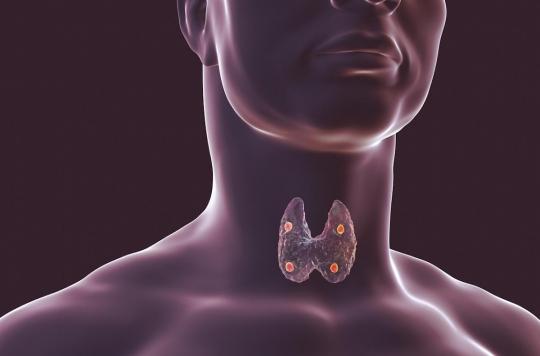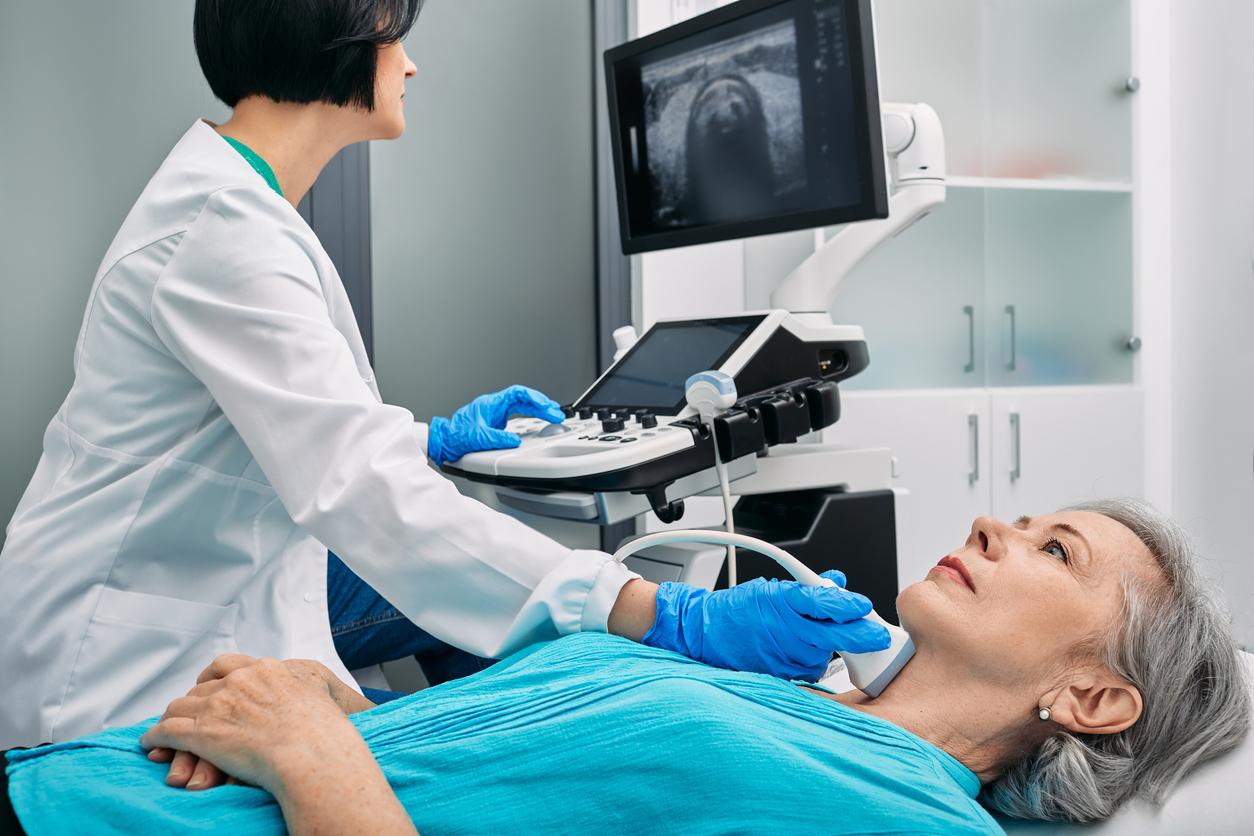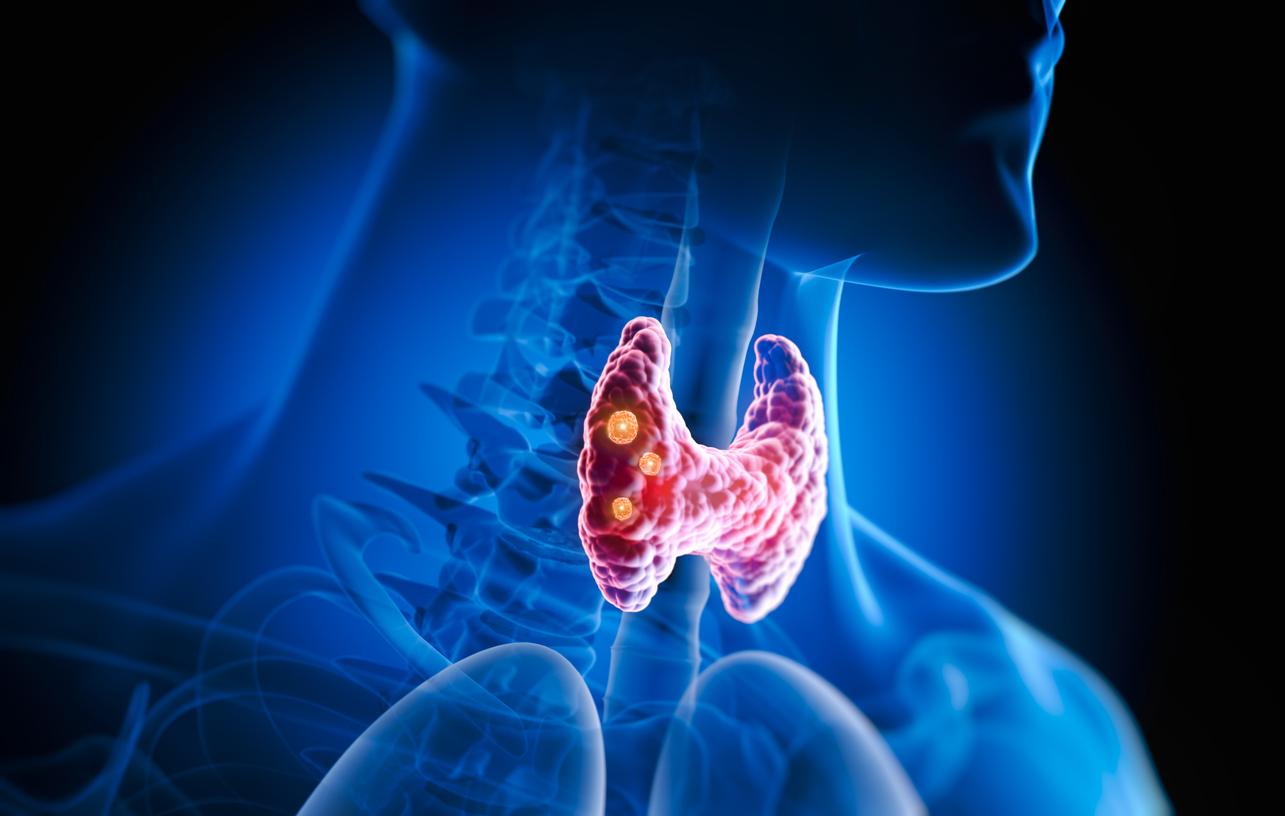May 25 is World Thyroid Day. The opportunity to explain what this small butterfly-shaped organ is and how it regulates our body.

- The thyroid gland is a small organ located at the base of the neck
- It regulates the vital functions of our body
- 10% of the French population suffer from a dysfunction of the thyroid gland
Located at the base of the neck, small in size and shaped like a butterfly, the thyroid gland regulates many vital functions of our body such as our heart rate, our body temperature, our digestion, our mood, our weight or even our sex life.
As detailed inCancer Institutein children, thyroid hormones “participate in the growth and development of the body through their action on the nervous system and the skeleton. In adulthood, they contribute to the functioning of the nervous system and the maintenance of bones “. Its role is so central in our body that thyroid dysfunction quickly impacts our well-being and our quality of life.
It is estimated in France that 10% of the population suffer from a thyroid disease. The two best known are hyperthyroidism, which corresponds to a abnormally high production of hormones by the thyroid gland and hypothyroidism, which conversely is characterized by low production of hormones by the thyroid gland.
Hyperthyroidism
In the first case, all metabolic processes in the body are accelerated: the person will suffer from palpitations, shortness of breath, increased appetite and thirst, hyperemotivity, mood swings, sleep disturbances and tired. Other symptoms may occur such as an increase or decrease in libido, abandoning and/or painful periods, or even a decrease in muscle strength.
“I was very, very tired, like during the first months of pregnancy, explains Mounira, whose hyperthyroidism was diagnosed in 2014. Even if I slept at 11 a.m., I took the road to work in the morning and I fell asleep on the road. I had dizziness, a lot of tremors, the impression that I was going to feel faint at all. moment as my legs gave out. I was very sensitive, I could cry for a yes or a no. I oscillated between sadness and anger, my emotions were increased tenfold.
In 90% of cases, “Graves’ disease” is the cause of hyperthyroidism. It is an “autoimmune” disease linked to a malfunction of the immune system and the presence of antibodies that stimulate the thyroid, causing it to produce more hormones. There is often a family plot, even if it is not an inherited disease. Thyroid nodules, small masses that form in the thyroid gland, or “toxic multinodular goiter” (which more readily affects people over 60) are other factors of hyperthyroidism.
hypothyroidism
hypothyroidism is, on the contrary, a metabolic slowdown syndrome and can lead to low energy and motivation, weight gain despite a lack of appetite, constipation, irritability, even depression, sometimes goiter or even muscle and joint pain. Hypothyroidism is known to the general public thanks to its controversial treatment: levothyrox.
To fully understand the levothyrox business, it should be remembered that hypothyroidism can cause a deep feeling of loneliness, sadness and lead to depression. People with an overactive thyroid gland may show signs of anxiety, nervousness, impatience and depression punctuated by sleep disturbances.
In both cases (hypothyroidism or hyperthyroidism), the person will be subject to profound physical and mental upheavals that can lead to the development of anxiety disorders. “In extreme cases, they may even seem schizophrenic, lose touch with reality, delirious or have hallucinations, explains the thyroid foundation of canada. Fortunately, an appropriate treatment will maintain the balance of the activity of her thyroid gland, thus exempting her from these inconveniences.
thyroiditis and cancer
There are other thyroid diseases, including thyroiditis, a inflammatory infection of the thyroid gland, of which several types have been identified: autoimmune thyroiditis which is characterized by the appearance of antibodies attacking the thyroid, Hashimoto’s thyroiditis which occurs when the thyroid gland is attacked by the cells of the system immune, De Quervain’s thyroiditis, Riedel’s thyroiditis and finally postpartum thyroiditis, which occurs a few months after childbirth. Thyroiditis, depending on its type, can be accompanied by hyperthyroidism or hypothyroidism. Thyroid cancer is very rare in France with 5000 to 7000 new cases each year.


.














